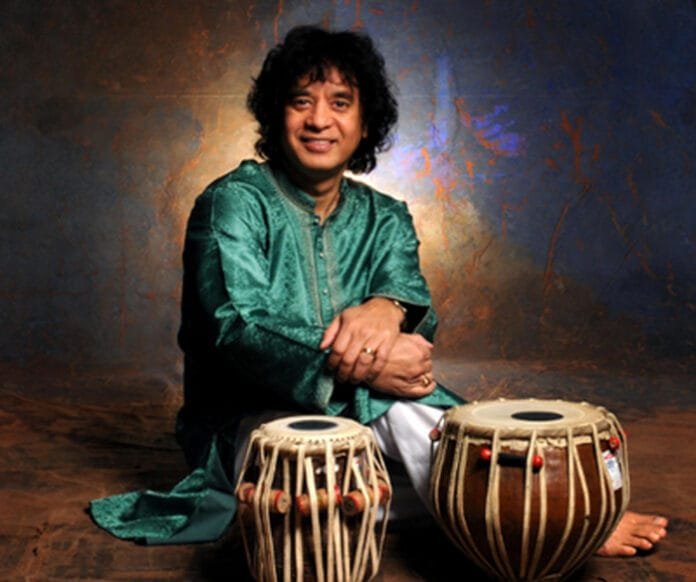The world of Indian classical music has lost one of its greatest legends, Ustad Zakir Hussain, who passed away at the age of 73 in a hospital in San Francisco, USA, on Monday morning. Known globally for his extraordinary tabla playing, Ustad Zakir Hussain’s death marks the end of an era for tabla enthusiasts and music lovers alike. He was admitted to the hospital last week due to health complications, primarily related to high blood pressure. Despite his health challenges, his legacy remains immortal, having shaped the world of music for over six decades.
A Glimpse into Ustad Zakir Hussain’s Remarkable Journey
Ustad Zakir Hussain was the son of the legendary Ustad Alla Rakha Khan, a pioneer of the tabla and one of the foremost tabla players of the 20th century. Born into a family with deep musical roots, Zakir Hussain inherited the art form from his father and began his training at a very young age. His profound knowledge of the tabla, combined with his innovative approach, propelled him to the pinnacle of the world of Indian classical music.
At the tender age of just 11 years, Ustad Zakir Hussain performed his first concert in the United States, making an indelible mark on the international music scene. Over the next 62 years, the tabla remained an inseparable part of his life, and he continued to mesmerize audiences worldwide with his virtuosity. His playing was not only a blend of traditional rhythms but also a reflection of his deep spiritual connection to the instrument.
Recognizing His Contributions to Music
Ustad Zakir Hussain’s contributions to music were nothing short of monumental. He was instrumental in elevating the status of the tabla on the global stage. Over the course of his illustrious career, Ustad Hussain was honored with numerous awards, including the prestigious Padma Bhushan and Padma Vibhushan from the Indian government. He received three Grammy Awards, cementing his position as a global ambassador for Indian classical music.
His Grammy-winning works, such as “Planet Drum” in 1992 and “Global Drum Project” in 2009, were milestones in his career. In 2024, Zakir Hussain made history by receiving three Grammy Awards for three different music albums, further solidifying his legacy as one of the greatest musicians of his time.
Legacy in Indian Classical Music
Ustad Zakir Hussain’s contributions were not limited to his performances alone. He played a pivotal role in making the tabla accessible to international audiences, seamlessly blending traditional techniques with contemporary styles. His deep understanding of rhythm, coupled with his ability to innovate, allowed him to collaborate with artists across genres, ranging from classical to jazz and fusion music.
As a teacher, Ustad Zakir Hussain imparted his knowledge to many students around the world, ensuring that the art form of tabla continues to thrive for future generations. His ability to create new rhythms and sounds with the tabla allowed him to push boundaries and redefine how the instrument was perceived, both in Indian classical music and the global music scene.
Zakir Hussain’s Role in Film and Acting
Beyond his musical talents, Zakir Hussain also ventured into the world of acting. His debut film appearance came in 1983, with the movie Heat and Dust. His unique talent for connecting with the audience also extended to his film roles. Zakir Hussain appeared in several Bollywood films, including The Perfect Murder (1988), Miss Beatty’s Children (1992), and Saaz (1998), showcasing his versatility as an artist.
Though his career as an actor did not overshadow his music, his film appearances added a different dimension to his already impressive artistic repertoire. His presence on the silver screen added another layer of depth to his artistic identity, blending the traditional and contemporary in all his endeavors.
Connecting the Tabla to the Masses
One of the most endearing qualities of Ustad Zakir Hussain was his ability to connect the tabla with people from all walks of life. In his performances, he would often create unique sounds with his tabla, such as the sound of a damru, shankh, or even the rhythm of raindrops. Through these sounds, he would narrate stories, expressing the philosophy behind the rhythms and showcasing the spiritual connection that tabla players share with their instruments.
He often referred to the damru of Lord Shiva, drawing parallels between the sound emanating from it and the rhythm of life itself. For Ustad Zakir Hussain, the tabla was not just a musical instrument—it was a spiritual entity, a medium through which he could express his deep reverence for the divine.
Ustad Zakir Hussain’s Family and Personal Life
Ustad Zakir Hussain came from a family deeply rooted in both music and spirituality. His father, Ustad Alla Rakha Khan, was born into a military family in Jammu and Kashmir and later became one of the most celebrated tabla players in the world. Zakir’s mother’s side also had a musical legacy, which further enriched his own training.
Zakir Hussain’s father was married twice. His first marriage was to Bawi Begum, with whom he had three sons—Zakir Hussain, Fazal Qureshi, and Toufeeq Qureshi—and two daughters. His second marriage was to Zeenat Begum, with whom he had a daughter, Ruhi Bano, a popular television actress in the 1980s.
In 1978, Zakir Hussain married Antonia Minicola, a Kathak dancer from Italy, who also served as his manager. Together, they had two daughters, Anisa Qureshi and Isabella Qureshi. Zakir’s early education took place at St. Michael’s School in Mumbai, followed by his graduation from St. Xavier’s College.
Final Thoughts: A Legacy That Will Live On
Ustad Zakir Hussain’s death marks the end of an era for Indian classical music and the tabla. Yet, his contribution to the world of music will continue to inspire musicians for generations to come. His unique sound, his ability to innovate, and his commitment to spreading the beauty of Indian classical music beyond the borders of India ensure that his legacy will live on.
As a musician, teacher, and artist, Ustad Zakir Hussain has left an indelible mark on the world. His profound influence on music, his tireless efforts to bring the tabla into the global spotlight, and his deep philosophical connection to rhythm will never be forgotten. Ustad Zakir Hussain’s passing may have left a void, but his music will forever remain a testament to his genius.
















